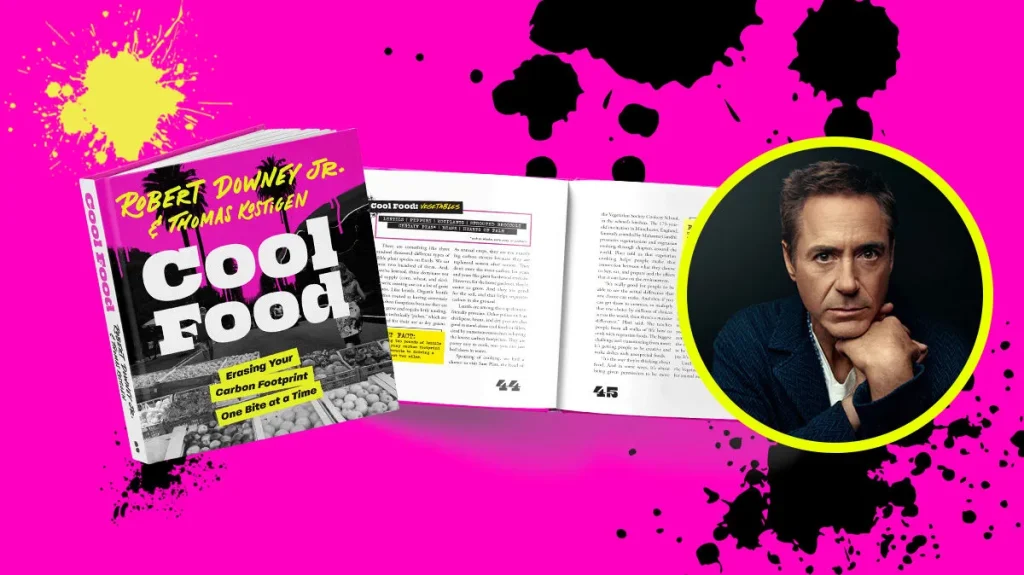‘Iron Man’ star Robert Downey Jr.’s new bestselling book about diet and climate change is part of his real-life superhero duties.
Actor, producer, and investor Robert Downey Jr. can now add best-selling environmental author to his résumé. Alongside author, Thomas Kostigen, Downey’s Cool Food: Erasing Your Carbon Footprint One Bite at a Time (Blackstone) is a New York Times bestseller. The book is the first major non-fiction offering for the Academy Award-nominated Oppenheimer star.
Downey says he overhauled his diet for his role as the Marvel superhero and as part of his environmental commitment. Now he’s sharing his tips with help from Kostigen, who has penned a number of books including Hacking Planet Earth and National Geographic’s The Extreme Weather Survival Guide. “With Kostigen in the cockpit, and Blackstone’s formidable ground control, it should be an actionable adventure. Join us,” Downey said in a statement.
Cool Food: Erasing Your Carbon Footprint One Bite at a Time
The book is focused on a “carbon-free” diet, including personal takes from Downey and Kostigen on “cool food” — meaning food that doesn’t contribute to global warming. They look at where foods are grown and manufactured, how they’re prepared, and where they’re sold and served. The book includes mostly vegan recipes as well.
“As the great Yogi Berra once said, ‘The future ain’t what it used to be,'” Kostigen said. “Increasingly, we are presented with forecasts of a worsening climate. Cool Food shows how we can change that outlook for the better by making a few different choices at the grocery store, trying something new on the restaurant menu, and by keeping an eye out for foods that store more carbon in the ground rather than polluting the air.”

Blackstone Publishing president and CEO Josh Stanton called the book “vital” saying that “Cool Food provides an approachable roadmap with practical steps to reduce our carbon footprint — and, with brilliant and witty Downey, Jr. and Kostigen at the helm, readers are sure to have a lot of fun as they learn, too.”
The book announcement came in 2022 on the heels of an IPCC report that recommended increased efforts to meeting the Paris Climate Accord targets for keeping temperatures from rising more than 1.5°C above pre-industrial temperatures. The report said humanity already has the tools it needs to avert disaster and stressed the urgent need to reduce global emissions dramatically over the rest of the decade. Specifically, it outlines a need to make drastic cuts to methane, a byproduct of factory farming. It’s suggesting a greenhouse gas peak before 2025 “at the latest” reducing all emissions by 43 percent by 2030 and methane by 33 percent.

“Even if we do this, it is almost inevitable that we will temporarily exceed this temperature threshold but could return to below it by the end of the century,” read the report. “It’s now or never, if we want to limit global warming to 1.5°C (2.7°F),” said IPCC Working Group III Co-Chair Jim Skea. “Without immediate and deep emissions reductions across all sectors, it will be impossible.”
Footprint Coalition
Downey increased his commitment to mitigate climate change in 2019 when he founded the Footprint Coalition. It originates investments in VC-backed businesses and offers opportunities for consumers to invest in its early-stage and late-stage funds as well as syndicates.
It’s focused on the adoption and scaling of sustainable technologies. It’s a backer of projects including bamboo toilet paper, cultivated seafood brand Wildtype, and Aspiration Bank, the platform behind Fenway Park’s efforts to become climate neutral.
In 2022, Downey received backlash after he tweeted that “the technologies that suck carbon out of the air and capture it” are as equally important in global efforts to halt global warming, as “building new renewable energy.”
The tech is indeed there; LanzaTech is making strides in carbon capture that could help put spent carbon back into a sustainable economy, for example. But as reported in Axios, for many climate scientists, “it’s imperative that we cut emissions sooner to avoid staking the future on risky technology bets to remove carbon later.”
One area all climate scientists seem to agree on is our plates. “Our best global food future requires no hand-wringing, fad diets, or radical shame,” says Downey, “just a perspective shift to discovering the many solutions in plain sight.”
In a 2022 op-ed about the Coalition’s science grants for Fast Company, Downey said Footprint Coalition selected five areas of focus Indigenous knowledge, community science and environmental justice projects, conservation biotech projects, cellular agriculture, and artificial intelligence. “We are in the business of supporting entrepreneurial scientists and we are in agreement that the major impediments are the obvious limitations of decision-making by committee. We’re trying something different,” he wrote. “FootPrint Coalition is funding early research in brand new environmental fields, and doing it under the direction of esteemed Science Leads who can move quickly and fund at their discretion.”
The star also turned six of his classic cars into electric vehicles. The cars, featured on his Max series Downey’s Dream Cars, will all be given away in a year-long contest. The cars are currently on display at the Chicago Auto Show.
Related on Ethos:


